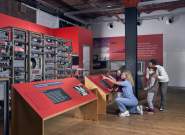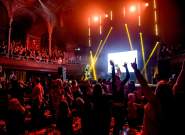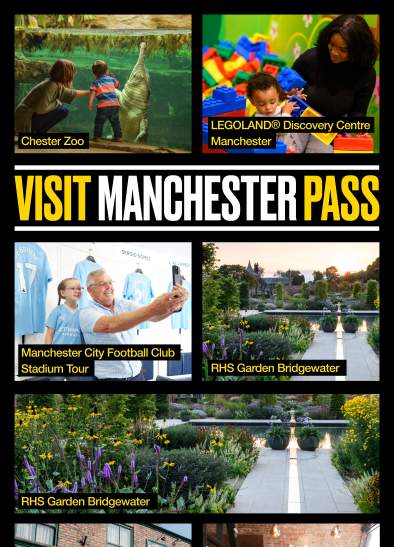1653 Chetham’s Library is the first public library in the English-speaking world
1761 ‘Canal Mania’ began in 1761 when The Bridgewater Canal became the first man-made waterway in Britain. In Manchester today the existing network of canals are now home to chic apartments, restaurants and bars.
http://www.bridgewatercanal.co.uk/history/
1779 Samuel Crompton invented the spinning mule in 1779. This combined the finer thread of the spinning jenny with the strength of thread produced by the water frame. The machinery could now became very large. Helmshore Mills Textile Museum has excellent working examples of the machinery of the day.
1783 First steam power mill set up by Richard Arkwright paving the way for mass production techniques
1803 Atomic Theory published by John Dalton, a precursor to all modern chemistry. John Dalton’s papers can be seen at John Rylands Library
1809 Inspired by the sermons of Rev. William Cowherd the vegetarian movement began in Salford Bible Christian Church. The Altrincham-based Vegetarian Society holds events all year round. Manchester is now a culinary city with a burgeoning restaurant scene offering a multitude of cuisines.
1819 The Peterloo Massacre occurred at St Peter’s Field, Manchester, on 16 August, 1819.
1824 William Sturgeon invented the electromagnet.
1830 First passenger railway started operating from purpose-built station at Liverpool Road
http://www.historypod.net/10/08/8th-october-1829-stephensons-rocket-wins-the-rainhill-trials/
1833 The Co-operative movement was founded in Rochdale, and in 1833 hosted the first national co-operative conference in the world.
1841 Sir Joseph Whitworth (1803-87) becomes the father of precision engineering. His work finding true planes allowed him to gain accuracies in tool making up 0.000001 inch. In 1941 he became the first person to develop a standard screw thread. He was also the first to design a mechanical steam cleaner and is commemorated by Whitworth Street in Manchester.
1845 Friedrich Engels based the seminal Condition of the English Working Class – published in 1845 - on his experiences in Salford and carried out his research in the City.
1849 First law in thermodynamics – this law of physics concerning the mechanical equivalence of heat was discovered by James Prescott Joule (1819-89) whose work is commemorated by the international name for the unit of energy – the ‘joule’.
1853 Microphotography invented by John Benjamin Dancer
1858 Founded in 1858, Manchester’s Hallé is Britain’s longest established symphony orchestra.
1866 Salford Trades Union Council, or Salford TUC, held its first meeting at the Three Crowns pub on King Street in Greengate, Salford, on 9 November 1866. Until that point, many trades unions, councils and societies had existed in isolation all over the country. It was at this Salford meeting that Salford TUC president, Samuel Nicholson, said, ‘why not have a congress of our own?’
1867 The National Society for Women’s Suffrage had been founded in Manchester by Lydia Becker
1868 The first general meeting of the Trades Union Congress was held in 1868 in the Mechanics Institute, Princess Street.
1880 First submarine launched: designed by Reverend George Garrett.
1888 The world’s first professional football league is set up at the Royal Hotel, Piccadilly.
1894 Opening of the Port of Manchester. One of, if not, the world’s first inland sea port. That same year, the first Marks & Spencers store opened in Stretford Road, Hulme, Manchester.
1896 Trafford Park became the first purpose-built industrial estate in the world.
1903 In 1903 Mancunian Emmeline Pankhurst founded the Women’s Social and Political Union, later known as the Suffragettes. Emmeline dedicated her life to the campaign for women’s votes. The Pankhurst Centre, previously Emmeline’s home, displays the work and struggle of the women suffragettes.
1904 In 1904, Frederick Royce produced the first car from his factory in Cooke Street, Hulme. He soon attracted the attention of Charles Rolls and following a meeting in the Midland Hotel, they set up the famous company which bears their names. Rolls meets Royce at the Midland Hotel and set up company together.
1908 The first British plane was designed and flown by A V Roe in 1908. And in 1919 Alcock and Brown both Manchester Central High School students were the first to fly the Atlantic Ocean non-stop.
1917 Atom is split by Ernest Rutherford at The University of Manchester – a series of experiments took place between 1914 and 1919, helping to make Manchester the birthplace of nuclear physics.
1918 The Representation of the People Act 1918, which enabled all men and some women over the age of 30 to vote for the first time. The act received Royal Assent on February 6, 1918 and followed campaigning by Emmeline Pankhurst and the Suffragettes. The first women to vote took part in the general election staged on December 14, 1918.
1919 The first UK domestic air service was recorded as being from Alexandra Park Aerodrome in Manchester to Southport and Blackpool and commenced on 24th May 1919.
1948 Manchester University Professors Tom Kilburn and Fred Williams developed the first computer. Nicknamed ‘The Baby’ it was the first computer to have a stored programme and memory. It made the computer what it is today.
1948 Launch of the NHS at Park Hospital, Manchester, now Trafford General.
1960 The world’s longest running soap opera, Coronation Street, is shown for the first time.
1964 The launch of the modern LGBT movement at a public meeting at Church House on Deansgate
1976 The Sex Pistols’ Lesser Free Trade Hall gig was attended by Morrissey, Mark E Smith, Anthony Wilson, Joy Division and The Buzzcocks.
1978 First test-tube baby: Louise Brown, is born in Manchester
1988 The largest LGBT civil rights march against the then Clause, later Section 28 which prohibited the promotion of homosexuality in schools.
2000 Transitive produce Rosetta: a market game-changer one of Apple and IBM’s most important software tools
2004 The CIS Tower in Manchester city centre becomes the UK’s largest solar project. Its 7,244 solar photovoltaic panels generate 180,000 units of renewable electricity each year.
2004 Graphene isolated by Professors Andre Geim and Kostya Novoselov at the University of Manchester; world’s first 2D material
2005 3D printer of human tissue developed at the University of Manchester
2010 Nobel Prize for Physics awarded to graphene scientists, the city’s 24th and 25th Nobel Laureates
2011 MediaCityUK, Europe’s largest purpose-built digital and media hub is awarded the status of the world’s first sustainable community by BREEAM
2012 The Olympics are the world’s first interactive tapeless sporting event broadcast from MediaCityUK
2015 National Graphene Institute opens pioneering research into the ground-breaking technology
2016 First UK city to be awarded the prestigious title of European City of Science, acknowledging the city’s innovative endeavours in science and technology







